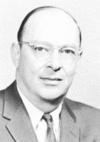- Bardeen, John
-
died Jan. 30, 1991, Boston, Mass.U.S. physicist.He earned a Ph.D. in mathematical physics from Princeton University. He worked for the U.S. Naval Ordnance Laboratory during World War II, after which he worked for Bell Telephone Laboratories. His work there led to his sharing a 1956 Nobel Prize with William B. Shockley and Walter H. Brattain for the invention of the transistor. In 1972 he again shared a Nobel Prize, this time with Leon Cooper and J. Robert Schrieffer for developing the theory of superconductivity (1957); this theory (called the BCS theory, for Bardeen-Cooper-Schrieffer) is the basis for all later theoretical work in superconductivity. Bardeen was also the author of a theory explaining certain properties of semiconductors.
 Bardeen.Courtesy of University of Illinois at Urbana-Champaign
Bardeen.Courtesy of University of Illinois at Urbana-Champaign* * *
▪ American physicistborn May 23, 1908, Madison, Wis., U.S.died Jan. 30, 1991, Boston, Mass.American physicist who was cowinner of the Nobel Prize for Physics in both 1956 and 1972. He shared the 1956 prize with William B. Shockley (Shockley, William B.) and Walter H. Brattain (Brattain, Walter H.) for their joint invention of the transistor. With Leon N. Cooper (Cooper, Leon N.) and John R. Schrieffer (Schrieffer, John Robert) he was awarded the 1972 prize for development of the theory of superconductivity.Bardeen earned bachelor's and master's degrees in electrical engineering from the University of Wisconsin (Madison) and obtained his doctorate in 1936 in mathematical physics from Princeton University. A staff member of the University of Minnesota, Minneapolis, from 1938 to 1941, he served as principal physicist at the U.S. Naval Ordnance Laboratory in Washington, D.C., during World War II.After the war Bardeen joined (1945) the Bell Telephone Laboratories in Murray Hill, N.J., where he, Brattain, and Shockley conducted research on the electron-conducting properties of semiconductors. On Dec. 23, 1947, they unveiled the transistor, which ushered in the electronic revolution. The transistor replaced the larger and bulkier vacuum tube and provided the technology for miniaturizing the electronic switches and other components needed in the construction of computers.In the early 1950s Bardeen resumed research he had begun in the 1930s on superconductivity, and his Nobel Prize-winning investigations provided a theoretical explanation of the disappearance of electrical resistance in materials at temperatures close to absolute zero. The BCS theory of superconductivity (from the initials of Bardeen, Cooper, and Schrieffer) was first advanced in 1957 and became the basis for all later theoretical work in superconductivity. Bardeen was also the author of a theory explaining certain properties of semiconductors. He served as a professor of electrical engineering and physics at the University of Illinois, Urbana-Champaign, from 1951 to 1975.* * *
Universalium. 2010.
